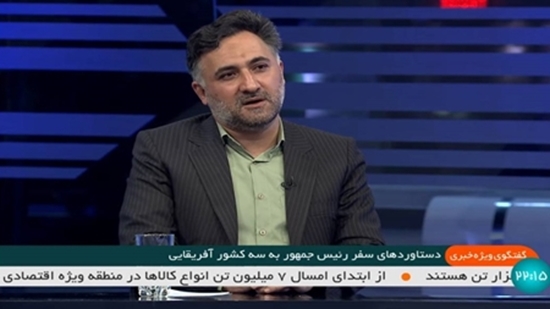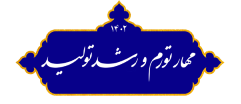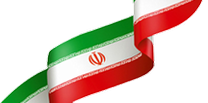The flight of Iranian drones over African fields
Dehghani explained in a special news interview with Sima: technological cooperation between Iran and African countries on the axis of "health", "resources" and "agriculture"
The Vice President of Science, Technology and Knowledge-based Economy last night appeared in the live program of a special news interview of the national media and explained the strategies and achievements of the government's trip to three West African countries.

According to the report of the Communication and Information Center in the Vice Presidency of Science, Technology and Knowledge-Based Economy, Hojjatul-Islam va-Muslimeen, Dr. Seyed Ebrahim Raeisi, the President of our country, with the aim of expanding economic, technological and strategic interactions and cooperation, traveled to three countries: Zimbabwe, Kenya and Uganda. He returned to the country on Friday. Strengthening strategic relations, signing 21 agreements and cooperation documents, removing barriers to trade exchanges, were among the focus of this three-day trip.
One of the prominent topics and axes of cooperation in this trip was the development and strengthening of scientific and technological exchanges, the creation of markets and the strengthening of export capacities for knowledge-based companies and cooperation in research, technological projects and joint companies.
Ruhollah Dehghani, Vice President of Science, Technology and Knowledge-based Economy, who accompanied the president on this trip, pointing to technology and innovation as the main focus and subject of discussions in this three-day trip, said: Considering the capacities and opportunities that exist in the continent Africa exists, one of the central policies of the 13th government is cooperation with African countries because there are very good capacities for exchange and multilateral scientific, technological and economic cooperation, developing the markets of Iranian products and creating high added value.
Vice President of Science, Technology and Knowledge-based Economy of the President, pointing out that the three-day trip to three West African countries was made mainly with the aim of promoting technological and economic cooperation, said: Developing foreign relations is one of the government's serious policies, and in the meantime, cooperation and paying attention to the countries whose capacities are less focused on is in the government's priorities.
Dehghani continued: Considering the very good capacities of West African countries, an intensive and comprehensive program was made in the form of a three-day trip to the three mentioned countries, which included business interactions and meetings with Iranians living in these countries. This trip, despite being compressed, had valuable results that I hope its blessings and fruits will appear in the context of the society's life.
The head of the National Elites Foundation considered the African continent to be one of the most capable places in the world for technological interactions and the introduction of Iran's achievements in this field and said: Africa, as the oldest and richest continent in the world, is full of special underground and territorial opportunities, including mines, agriculture, food and other strategic areas. Due to the high value of these resources, Western countries have not allowed technology and progress to enter African countries and have created less space for African countries to have resource independence, economic independence and technological progress. For a country like us that has long-standing relations and very good technological capacities, this is a very good and valuable capacity to export technological products to Africa.
Stating that the most important focus and goal of the president's trip to Africa was the development of technological and innovative cooperation, Dehghani said: Technological issues and discussions were at the top of the discussions and interaction with the presidents of Kenya and Uganda. More than 50% of the talks revolve around technological cooperation, which shows the interest of African countries in benefiting from Iran's scientific and technological capacities and knowledge-based products and services.
He considered the African society's awareness of the necessity of creating added value and completing value chains as one of the good opportunities for Iran's presence in the market of these countries and added: due to the development of information and communication technologies in African countries and the awakening of people in the information age, they have realized that they should prevent the raw sale of resources, protect and protect these resources, complete value chains in their country, and develop their economy by relying on technology and innovation. These rich countries are full of opportunities and are developing.
Vice President of Science, Technology and Knowledge-Based Economy considered underground resources, agriculture, food security and health as the three core areas of cooperation between Iran and African countries with the aim of completing value chains and creating added value and said: according to the investigations and interactions that have taken place and the studies that have been carried out, it has been determined that there are three very good potential areas in Africa, where underground resources and mines rich in these capacities are considered the most important of these capacities, because Africa is a rich continent in terms of underground resources; Abundant oil and hydrocarbon resources in some African countries, with the adoption of technology, can be the basis for the creation of significant and rich added value.
Dehghani considered agriculture and food security as another axis of Iran's cooperation on the axis of technology and innovation and added: agricultural capacities and rich food resources are another capacities of African countries and these countries have many capabilities in the field of food production, but maybe sometimes in If market attraction and development are not successful, the connection of technology and innovation to this field can also be value-creating and wealth-generating. Also, information and communication technology, tourism and health are also considered as other areas that have the capacity to develop cooperation in Africa.
The vice president of science, technology and knowledge-based economy said: Iran's assistance to these countries is aimed at completing value chains and improving technological resilience so that they can complete the missing links of processing, create added value and supply the product with added value to the market.
Dehghani considered medical and health equipment to be another area of interest of African countries for Iran's technological presence and added: There is another area in which all countries are generally interested in investing and developing technology, and Iran has made very valuable achievements in this field. It is the field of medicine, health and medical equipment. In recent years, interest in Iran's capabilities in the field of health has increased due to high quality, lower prices, and meeting the needs of the people of Muslim countries.
Referring to Iran's readiness for technological investment and cooperation centered on knowledge-based companies, he said: Currently, we do not have the opportunity to invest in the traditional way and build infrastructure in Africa, but Iran's scientific, technological and Foreign samples are much cheaper and sometimes with a price up to 20 times lower than the foreign equivalent, and therefore if we can use the opportunity of technological investment in Africa, it can bring a good capacity for soft exports with very high achievements for the country.innovative investment opportunities are very high, and Iran's technology is of equal quality.
Iranian drones over the sky of African fields
Referring to the capability of Iran's UAV and its applications in commercial fields, including agriculture, the vice president of science, technology and knowledge-based economics said: The Islamic Republic of Iran has well shown to the world that in addition to its progress and high capabilities in the military field, it has technological advantages and the entry of technical and military achievements into the commercial arena.
He added: The government's serious policy is to show the world that Iran is not just a defense and military power, and in the last few decades, due to the serious support of the Supreme Leader of the Islamic Revolution and technological efforts, Iran is a superior scientific and technological power. Africa is agriculture-oriented and needs advanced technologies to improve productivity and smart agriculture.
Referring to the entry of Made in Iran technologies into the African market, including agricultural drones, Dehghani added: Iran-made drones that were unveiled and soon special centers to provide services related to this drone will be set up in African countries, including Uganda, have advantages and capabilities. It is special. One of the capabilities of this drone is to spray fields at a speed of two hectares in 15 minutes, a capability that may not be possible with human power. In addition, intelligence in spraying and accurate consumption of the amount of poison is one of the characteristics of agricultural drones made in Iran.
He added: With the capabilities of smart technologies and with the help of image processing, an accurate and comprehensive picture of the condition of agricultural lands is presented in the form of detailed reports that help to improve productivity and planning in the field of agriculture.
Increasing Iran's share of the 1,200-billion-dollar market of African countries
Referring to the necessity of increasing Iran's share of the 1200-billion-dollar African market, the vice president of science, technology and knowledge-based economy said: Currently, less than one-tenth of Iran's share of the African market is in the possession of Iranian companies and investors, a matter that requires It is serious consideration. At the same time, the desire of Africans to cooperate with Iran is very high, Iran should also have serious planning in all areas to cooperate with African countries.
Dehghani considered the field of oil and hydrocarbon resources of African countries as one of the fields of technological role-playing of the country's knowledge-based companies and said: due to the discoveries that some African countries have made in the field of oil, they are very enthusiastic about refinery technologies, extraction and processing of technological capabilities. We can cooperate with engineering services, refinery designs and the supply of oil industry products and equipment in the African refinery industry, and this market is so vast that a small step can bring huge achievements.
The head of the National Elites Foundation, emphasizing the accurate introduction and creation of awareness of the markets of African countries, said: contrary to media insinuations, African countries are not poor countries that are always at war and disease; Rather, the flow of technological development and progress in these countries is a dynamic flow, and in the first step, we must raise the knowledge of investors, technology activists and companies about the opportunities of this golden continent.
The role of Iran's technology and innovation houses in the form of specialized technology embassies
Referring to the activity of Iran's technology and innovation houses in the countries, as the offices of extensive cooperation in science, technology and knowledge-based economy, the vice president of science, technology and knowledge-based economy said: the function of this technology and innovation house is like a hub or an extensive center of scientific and technological consultations which connects Iran's capabilities in the field of science, technology and knowledge-based economy to the demand sides in African countries.
Dehghani continued: These centers will actually be a specialized embassy in the field of science and technology that will introduce competitive and marketable Iranian technological products and services to the market of this country, and Iranian technological activists will be able to present their products and achievements to the large market of the countries of this continent. supply
He added: We need to increase companies' visits and participation in the technological programs of Iran and other African countries. In this regard, we have made serious plans that can increase mutual recognition and trust. We believe that if the government shows opportunities and provides opportunities for interaction, companies and technologists can be present in these countries in a better way.
Iran's ability to effectively participate in the African health market
The Vice President of Science, Technology and Knowledge-based Economy pointed to the pure opportunities of African countries for the presence of knowledge-based products in our country's health sector and stated: For example, Uganda, a country that has eight times its own population of light and heavy livestock, is a potential large market in the field of veterinary medicine. It is considered a very good opportunity for Iran's knowledge-based companies to offer their products and services in various fields of veterinary medicine, including livestock and poultry vaccines, to this market. If Iran's knowledge-based companies and other players in the field of knowledge and technology are aware of these capacities, we will definitely witness the formation of a large and dynamic market in the field of science, technology and knowledge-based economy between Iran and other African countries.
Stating that we plan to develop cooperation in three layers, Dehghani added: The first layer is the cooperation of Iranian professors and experts with the corresponding parties in African countries. The second layer is for Iranian companies and African companies, and in the third layer for Iranian managers and African managers, we have a plan that will be implemented during one year, which will be the most important process of creating recognition and cooperation.
Stating that economic prosperity with this cooperation will be felt in people's table and livelihood, he continued: Some fields, such as extraterritorial cultivation, will show their role in improving people's lives more quickly. Although our country has good agricultural capacities, some countries give us good opportunities for production due to cheaper infrastructure and resources. When we use a few hundred hectares of land in Uganda for agriculture, you get a cheaper and cheaper product of higher quality. This opportunity for interaction and cooperation will improve the economy of the two countries. The development of animal husbandry in a country like Uganda is a very good capacity that has received less attention in the past, and Iranian livestock production in a country like Uganda can be followed seriously.
The head of the National Elites Foundation stated that Iran's capabilities and progress in the field of medicine and health have become one of the axes of negotiations with other countries and Iran's competitive ability in international markets has become a national capital, adding: Currently, in the Kenyan market, We have two registered anti-cancer drugs that have been marketed in Africa, as well as 10 products that are being registered and 50 medical devices that are registered and sold in Kenya. Good price, high quality and favorable support and response are the advantages of Iranian products that make African countries interested in using our country's products and services.
Dehghani stated: Africa is one of the largest markets for second-hand goods in the world, and the goods produced in Iran sometimes cost several times the price of newly produced samples in the second-hand market of Africa. There are plenty of such markets in Africa, and if we can facilitate transportation, cancel visas, which was seriously discussed during this trip, and provide direct flights to these countries, and increase people's knowledge of African countries, then there will definitely be a very large market. It will be good for the people of our country and Iranian businessmen.
The vice president for science, technology and knowledge-based economy considered smart and correct cooperation as a bilateral cooperation based on import and export and added: based on interaction, import and export will be dynamic and continuous. Technological and knowledge-based companies, as well as other investors and traders, should also pay special attention to this clearing opportunity.






 adress : No. 209 , between Navab Str and Roudaki Str. Azadi Str. Tehran - Iran
adress : No. 209 , between Navab Str and Roudaki Str. Azadi Str. Tehran - Iran  phone: +98 21 63478000
phone: +98 21 63478000
نظر دهید